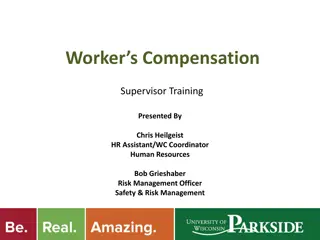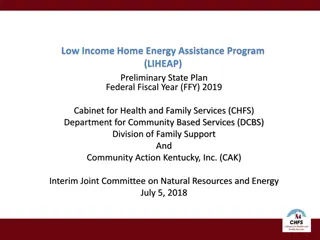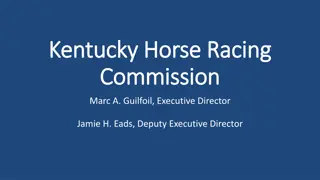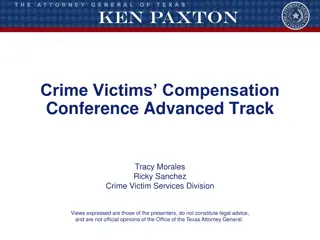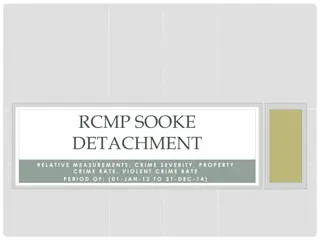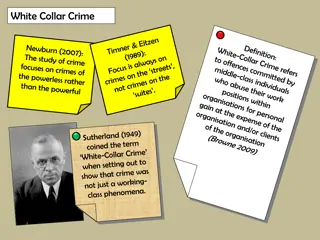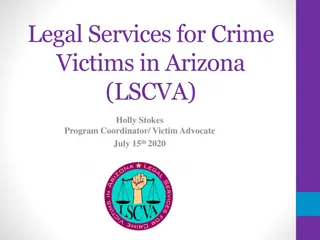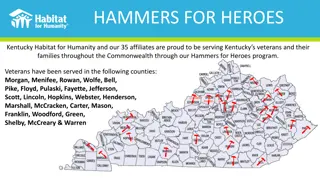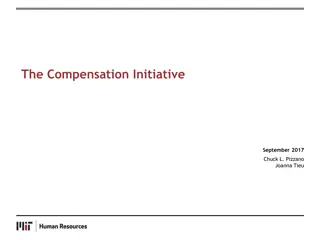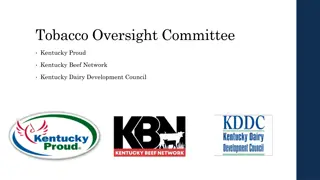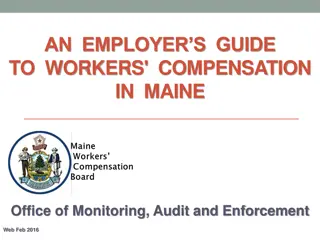Kentucky Crime Victims Compensation Program Overview
Kentucky Claims Commission Crime Victims Compensation Program provides financial assistance to eligible individuals who have suffered from criminally injurious conduct. Established in the mid-1970s, this program helps victims with various expenses incurred as a result of the crime, such as medical costs, funeral expenses, counseling, and more. Eligibility is based on specific criteria outlined in KRS Chapter 49, and there are compensable and non-compensable expenses that applicants should be aware of. The program also has a statute of limitations for filing claims.
Download Presentation

Please find below an Image/Link to download the presentation.
The content on the website is provided AS IS for your information and personal use only. It may not be sold, licensed, or shared on other websites without obtaining consent from the author. Download presentation by click this link. If you encounter any issues during the download, it is possible that the publisher has removed the file from their server.
E N D
Presentation Transcript
Kentucky Claims Commission Crime Victims Compensation Program
Commission Members & Staff Commission Members Staff Tim Cocanougher, Executive Director Hon. Marcus Carey, Chairperson and Attorney Mitch Mattingly, Staff Attorney Hon. Delana Sanders, Member and Attorney Raymond Shields, Clerk Jennifer Barrie, Restitution Officer Hon. Carlo Wessels, Member and Attorney Investigators: Stephanie Vandeveer, Cathy Greene, Amanda McCuiston
What is the Crime Victims Compensation Program? As a matter of grace, the General Assembly enacted the Crime Victims Compensation Program in the mid-1970 s in order to assist needy individuals whom are victims of crime with eligible expenses that are incurred as a direct result of that crime. All fifty states, plus the U.S. territories of Guam and Puerto Rico, have crime victims compensation programs. The Crime Victims Compensation Program operates under KRS Chapter 49 and KAR Title 802.
Eligibility Requirements KRS 49.310(1) A victim of criminally injurious conduct; A surviving spouse, parent, or child of a victim of criminally injurious conduct who died as a direct result of such conduct; Any other person dependent for his principal support upon a victim of criminally injurious conduct who died as a direct result of such crime; and Any person who is legally responsible for the medical expenses or funeral expenses of a victim.
Compensable v. Non- Compensable Expenses Non-Compensable Expenses (not an exhaustive list) Compensable Expenses Medical/Dental Relocation Funeral/Burial Crime Scene Cleanup Mental Health Counseling Lodging/Fuel Expenses Lost Wages Emotional Distress Loss of Support Loss of Consortium Eyeglasses Property Damage/Loss
Statute of Limitations KRS 49.330(2) Kentucky s statute of limitations on the filing of CVC claims is 5 years from the date of the crime OR from the date that the conduct was discovered. There is no automatic barring of claims being filed outside the five year statute of limitations. If a claim is filed outside of five years, then good cause must be shown for the delay in filing. The Commission possesses discretion to determine what good cause is.
General Claims Process Flowchart Claim Form Received Investigator Clerk Commission Member Full Restitution Officer Commission Appeal to Circuit Court
Investigators Investigates claims to assist Commission in determining suitability for the receipt of benefits under KRS 49 Consults with victim advocates, prosecutors, law enforcement officials, service providers, insurance companies, and private attorneys Drafts an Investigative Report and prepares case file for Clerk
Clerk Clerk is responsible for general agency case management from the receipt of new claims through the payment process Clerk assigns new cases to Commission Members on a rotating basis Commission Members issue a recommendation and Clerk drafts Recommended Order. Staff Attorney reviews Recommended Order for legal accuracy and correctness. Clerk serves Recommended Order on all required parties and places claim on the Commission s monthly agenda
Clerk, contd. Clerk prepares agenda and drafts minutes for the Commission s monthly meetings Commission meets once per month and issues final decisions on claims on the agenda Clerk drafts Final Orders based on Commission s decisions and serves Final Orders on all required parties If a claim is awarded, Clerk drafts payment information for submission to the Cabinet and the Treasury Department. Checks are cut, mailed to Clerk, and Clerk enters payments into database and mails checks out to the appropriate people/entities.
Restitution Officer After payments are made on a claim, and where an offender is present, Clerk gives case file to Restitution Officer Restitution Officer tries to either get restitution ordered from the offender if criminal litigation is ongoing or tries to get the court s restitution order amended if already ordered to reflect the Commission as a payee. Restitution Officer can only collect up to the amount paid out by the Commission! Any award made by the Commission creates a debt owed to the Commonwealth for an offender, even if restitution is not ordered!
Appeal Rights Claimants/victims have appeal rights to any order issued by the Commission Recommended Order appeals Claimant/victim has fifteen (15) days to file a written appeal from the date the Recommended Order was mailed Final Order appeals Claimant/victim can file for judicial review in either the circuit court in the county where the crime occurred OR in the Franklin Circuit Court within thirty (30) days from the date the Final Order was mailed
Questions? For legal questions, contact Staff Attorney Mitch Mattingly at 502-782-8245 or at mitchell.mattingly@ky.gov. For general program questions, contact Clerk Raymond Shields at 502-782-8242 or at raymond.shields@ky.gov.





